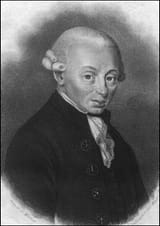Search Results
7/18/2025, 2:59:11 AM
Can the soul exist independent of its relation to the empirical foreground. Kant proves we cannot have knowledge of this because the categories which together synthesize unified apperception have no objective validity without content with which to work with, i.e., sensation. Without that content they are purely formal empty concepts without reality. In other words, the unity of apperception as existing in some disembodied state is a mere abstraction of thought lacking objective reality, i.e., spatio-temporal sensation. The claim that such a state is real is an appeal to divine revelation, but revelation has no place in rational dialogue since it presumes itself above it. At that point, I could just claim a contradictory revelation confirming my position and there's literally no way to refute me according to that standard of knowledge.
In other words, Kant demonstrates at least this much: the categories, as purely formal synthetic acts of the mind, cannot produce, by means of that synthesis, unity of apperception, without a material which is actually synthesized. Kant's dogma, I admit, is that this material is ONLY given by bodily sensation. BUT, if you disagree with this, it is up to you to prove that purely formal synthetic activity can occur without anything being synthesized, OR admit that the supposed soul is NOT a purely formal synthetic unity of apperception, but is simply that synthesis applied to some as yet undetermined material distinct from bodily sensation. In either case, the impetus is to demonstrate its reality apart from any appeal to divine revelation, since that defeats the point of rational debate. To defend this view, against someone who does not accept revelation as authority you can only appeal to reason.
In other words, Kant demonstrates at least this much: the categories, as purely formal synthetic acts of the mind, cannot produce, by means of that synthesis, unity of apperception, without a material which is actually synthesized. Kant's dogma, I admit, is that this material is ONLY given by bodily sensation. BUT, if you disagree with this, it is up to you to prove that purely formal synthetic activity can occur without anything being synthesized, OR admit that the supposed soul is NOT a purely formal synthetic unity of apperception, but is simply that synthesis applied to some as yet undetermined material distinct from bodily sensation. In either case, the impetus is to demonstrate its reality apart from any appeal to divine revelation, since that defeats the point of rational debate. To defend this view, against someone who does not accept revelation as authority you can only appeal to reason.
7/4/2025, 2:18:37 AM
>Nun zeigt es sich, welches überaus merkwürdig ist, daß selbst unter unsere Erfahrungen sich Erkentnisse mengen, die ihren Ursprung a priori haben müssen, und die vielleicht nur dazu dienen, um unsern Vorstellungen der Sinne Zusammenhang zu verschaffen. Denn, wenn man aus den ersteren auch alles wegschaft, was den Sinnen angehört, so bleiben dennoch gewisse ursprüngliche Begriffe und aus ihnen erzeugte Urtheile übrig, die gänzlich a priori, unabhängig von der Erfahrung entstanden seyn müssen, weil sie machen, daß man von den Gegenständen, die den Sinnen erscheinen, mehr sagen kan, wenigstens es sagen zu können glaubt, als bloße Erfahrung lehren würde, und daß Behauptungen wahre Allgemeinheit und strenge Nothwendigkeit enthalten, dergleichen die blos empirische Erkentniß nicht liefern kan.
Now, what's truly remarkable is that even within our experiences, knowledge emerges that must have its origin a priori. This knowledge perhaps solely serves to provide coherence to our sensory perceptions. For if you remove everything belonging to the senses from these experiences, certain original concepts and the judgments derived from them still remain. These must have originated entirely a priori, independent of experience. They allow us to say more about the objects appearing to our senses—or at least believe we can say more—than mere experience would teach. Furthermore, these assertions contain true universality and strict necessity, qualities that purely empirical knowledge cannot provide.
Now, what's truly remarkable is that even within our experiences, knowledge emerges that must have its origin a priori. This knowledge perhaps solely serves to provide coherence to our sensory perceptions. For if you remove everything belonging to the senses from these experiences, certain original concepts and the judgments derived from them still remain. These must have originated entirely a priori, independent of experience. They allow us to say more about the objects appearing to our senses—or at least believe we can say more—than mere experience would teach. Furthermore, these assertions contain true universality and strict necessity, qualities that purely empirical knowledge cannot provide.
Page 1
